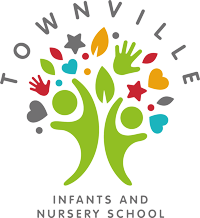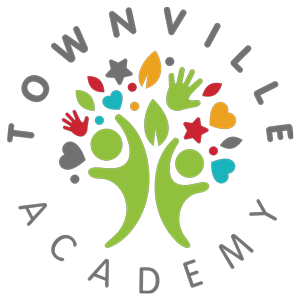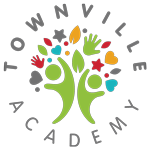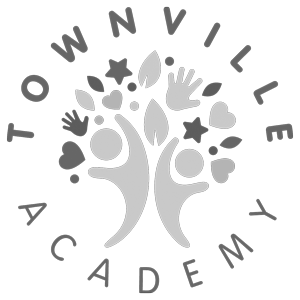At Townville Academy, we aspire to offer the best possible early education for all our children in a happy, safe, inclusive environment.
Throughout our science curriculum we aim to ensure our children:
- Understand that science is a part of every-day life and the study of living things.
- Are equipped with the knowledge, skills and understanding, which encourage children to be keen, inquisitive scientists now and in the future.
- Become competent scientists with “hands on” investigations and experiments: finding out from first-hand experience and testing hypotheses, in line with “working scientifically”
- Ask scientific questions and develop their curiosity of the world around them
- Develop scientific vocabulary and be able to use it to describe ideas, objects and explain concepts confidently.
- Promote opportunities for exploratory talk in order to develop ideas, arguments and deepen understanding.
- Understand that key skills they learn in science can be applied in other areas of the curriculum.
This build upon the children’s prior knowledge gained through the foundation stage for Science where children:
- Begin to ask and answer questions about the world around them
- Develop an understanding of their basic needs and the importance of healthy food choices
- Explore the natural world and make observations
- Draw upon their experiences and what has been read to them , begin to identify similarities and differences in relation to the natural world around them and contrasting habitats
- Understand some important processes and changes in the natural world around them, including the seasons and changing states of matter.
As inquisitive and investigative learners’ children in EYFS are given the opportunity to explore, problem solve and observe the world around them. They are encouraged to ask questions about why things happen and how things work and are challenged to share their ideas and make predictions. Children are given many opportunities to observe and manipulate objects and materials to identify differences and similarities whilst using their senses to explore the world around them.
At Townville Infant and Nursery School, Science is taught through a 2-year rolling program in KS1, designed to inspire children’s curiosity and to develop them as keen scientists. Effective use of educational visits and visitors are planned, to enrich and enhance the pupil’s learning experiences within the Science curriculum. We follow the Hamilton Trust mixed year group scheme of work and have adapted this to make strong links to other curriculum areas such as maths, art and computing and to ensure that the scheme is relevant to the needs of our children. Our adaptation of the scheme supports all the requirements of the National Curriculum and these are carefully mapped out through the use of our curriculum map, progression document and unit overviews to ensure that children are able to gain and build upon their knowledge and skills. We ensure that teachers are clear on the learning and expectations for their classes so that curriculum content is delivered in a progressive and sequential manner enabling children to build upon their prior knowledge and skills whilst ensuring underlying principles and meanings of subject specific vocabulary are taught and understood.
Our science curriculum is structured into six units across each year group which are based on a spiral curriculum. This means that each of the themes are revisited regularly (at least once in each year group), and pupils revisit each theme through a new unit that consolidates and builds on prior learning. As topics are revisited, this spiral curriculum enables the children to know more and remember more as it reduces the amount of knowledge lost through forgetting. Each lesson is sequenced so that it builds on the learning from the previous lesson, and where appropriate, activities are scaffolded so that all pupils can thrive and succeed.
Within each science lesson, children are explicitly told that they are working as ‘scientists’ and are reminded of the key knowledge and skills they will learn, use and develop throughout their science lessons before being introduced to and reminded of key vocabulary. Children then spend time revisiting and reviewing prior learning before being introduced to new concepts, knowledge or skills. Our lesson design ensures that children are provided with ample opportunity to consolidate, build upon and apply taught knowledge and skills whilst developing their ability to question, think critically and work scientifically. Ongoing assessment of the children’s knowledge and skills is used by class teachers to ensure that misconceptions are addressed, and next steps carefully planned for therefore enabling each child to make progress.
Science teaching is monitored regularly using a variety of strategies, such as book looks, lesson observations, feedback and pupil interviews. Throughout the delivery of each project, the subject coordinator will gather information regarding the children’s outcomes and work collaboratively with the curriculum lead to plan appropriate next steps for future learning, as well as to provide an overview of teaching and learning within science across school.
As inquisitive and investigative learners’ children in EYFS will begin to:
- Ask and answer questions about the world around them
- Develop an understanding of their basic needs and the importance of healthy food choices
- Explore the natural world and make observations
- Draw upon their experiences and what has been read to them , begin to identify similarities and differences in relation to the natural world around them and contrasting habitats
- Understand some important processes and changes in the natural world around them, including the seasons and changing states of matter
As a result of our carefully and skillfully sequenced, planned and taught History curriculum, children will:
- Understand that science is a part of every-day life and the study of living things.
- Be equipped with the knowledge, skills and understanding which has enabled them to become keen, inquisitive scientists now and in the future.
- Be competent scientists with vast experiences of working scientifically
- Ask scientific questions and develop their curiosity of the world around them
- Use their scientific vocabulary to describe ideas, objects and explain concepts confidently.
- Understand that key skills they learn in science can be applied in other areas of the curriculum.
Townville children will meet the end of Key Stage 1 National curriculum outcomes and will have a strong foundation of on which to build and further develop their scientific knowledge and skills.




